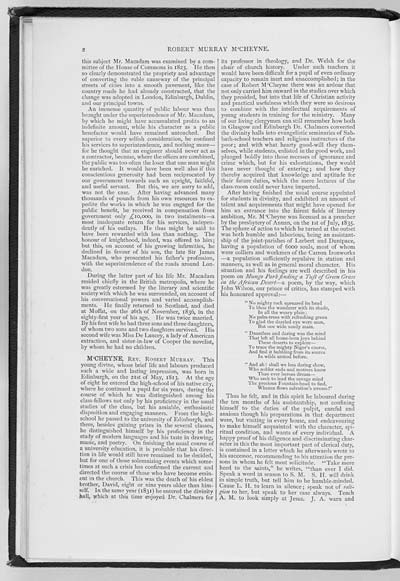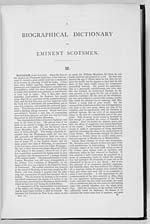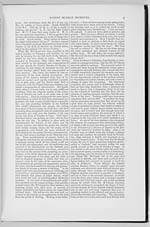Volume 3 > Half-Volume 5
(15) Page 2 - McCheyne, Robert Murray
Download files
Individual page:
Thumbnail gallery: Grid view | List view

2 this subject Mr. Macadam was examined by a com- mittee of the House of Commons in 1823. He then so clearly demonstrated the propriety and advantage of converting the ruble causeway of the principal streets of cities into a smooth pavement, like the country roads he had already constructed, that the change was adopted in London, Edinburgh, Dublin, and our principal towns. An immense quantity of public labour was thus brought under the superintendence of Mr. Macadam, by which he might have accumulated profits to an indefinite amount, while his character as a public benefactor would have remained untouched. But superior to every selfish consideration, he confined his services to superintendence, and nothing more� for he thought that an engineer should never act as a contractor, because, where the offices are combined, the public was too often the loser that one man might be enriched. It would have been well also if this conscientious generosity had been reciprocated by our government towards such an upright, faithful, and useful servant. But this, we are sorry to add, was not the case. After having advanced many thousands of pounds from his own resources to ex- pedite the works in which he was engaged for the public benefit, he received in compensation from government only � 10,000, in two instalments�a most inadequate return for his services, indepen- dently of his outlays. He thus might be said to have been rewarded with less than nothing. The honour of knighthood, indeed, was offered to him; but this, on account of his growing infirmities, he declined in favour of his son, the late Sir James Macadam, who prosecuted his father's profession, with the superintendence of the roads around Lon- don. During the latter part of his life Mr. Macadam resided chiefly in the British metropolis, where he was greatly esteemed by the literary and scientific society with which he was surrounded, on account of his conversational powers and varied accomplish- ments. He finally returned to Scotland, and died at Moffat, on the 26th of November, 1836, in the eighty-first year of his age. He was twice married. By his first wife he had three sons and three daughters, of whom two sons and two daughters survived. His second wife was Miss De Lancey, a lady of American extraction, and sister-in-law of Cooper the novelist, by whom he had no children. M'CHEYNE, REV. ROBERT MURRAY. This young divine, whose brief life and labours produced such a wide and lasting impression, was born in Edinburgh, on the 21st of May, 1813. At the age of eight he entered the high-school of his native city, where he continued a pupil for six years, during the course of which he was distinguished among his class-fellows not only by his proficiency in the usual studies of the class, but his amiable, enthusiastic disposition and engaging manners. From the high- school he passed to the university of Edinburgh, and there, besides gaining prizes in the several classes, he distinguished himself by his proficiency in the study of modern languages and his taste in drawing, music, and poetry. On finishing the usual course of a university education, it is probable that his direc- tion in life would still have remained to be decided, but for one of those solemnizing events which some- times at such a crisis has confirmed the current and directed the course of those who have become emin- ent in the church. This was the death of his eldest brother, David, eight or nine years older than him- self. In the same year (1831) he entered the divinity hall, which at this time enjoyed Dr. Chalmers, for its professor in theology, and Dr. Welsh for the chair of church history. Under such teachers it would have been difficult for a pupil of even ordinary capacity to remain inert and unaccomplished; in the case of Robert M'Cheyne there was an ardour that not only carried him onward in the studies over which they presided, but into that life of Christian activity and practical usefulness which they were so desirous to combine with the intellectual acquirements of young students in training for the ministry. Many of our living clergymen can still remember how both in Glasgow and Edinburgh Dr. Chalmers converted the divinity halls into evangelistic seminaries of Sab- bath-school teachers and religious instructors of the poor; and with what hearty good-will they them- selves, while students, enlisted in the good work, and plunged boldly into those recesses of ignorance and crime which, but for his exhortations, they would have never thought of entering; and how they thereby acquired that knowledge and aptitude for their future duties, which the mere lectures of the class-room could never have imparted. After having finished the usual course appointed for students in divinity, and exhibited an amount of talent and acquirements that might have opened for him an entrance into the fairest fields of literary ambition, Mr. M 'Cheyne was licensed as a preacher by the presbytery of Annan, on the 1st of July, 1835. The sphere of action to which he turned at the outset was both humble and laborious, being an assistant- ship of the joint-parishes of Larbert and Dunipace, having a population of 6000 souls, most of whom were colliers and workmen of the Carron Ironworks �a population sufficiently repulsive in station and manners, as well as in general moral character. His situation and his feelings are well described in his poem on Mungo Park finding a Tuft of Green Grass in the African Desert�a poem, by the way, which John Wilson, our prince of critics, has stamped with his honoured approval:� " No mighty rock upreared its head To bless the wanderer with its shade, In all the weary plain; No palm-trees with refreshing green To glad the dazzled eye were seen, But one wide sandy main. " Dauntless and daring was the mind That left all home-born joys behind These deserts to explore� To trace the mighty Niger's course, And find it bubbling from its source In wilds untrod before. " And ah! shall we less daring show, Who nobler ends and motives know Than ever heroes dream� Who seek to lead the savage mind The precious Fountain-head to find, Whence flows salvation's stream?" Thus he felt, and in this spirit he laboured during the ten months of his assistantship, not confining himself to the duties of the pulpit, careful and anxious though his preparations in that department were, but visiting in every house, and endeavouring to make himself acquainted with the character, spi- ritual condition, and wants of every individual. A happy proof of his diligence and discriminating char- acter in this the most important part of clerical duty, is contained in a letter which he afterwards wrote to his successor, recommending to his attention the per- sons in whom he felt most solicitude. "Take more heed to the saints," he writes, "than ever I did. Speak a word in season to S. M. S. H. will drink in simple truth, but tell him to be humble-minded. Cause L. H. to learn in silence; speak not of reli- gion to her, but speak to her case always. Teach A. M. to look simply at Jesus* J. A. warn and
Set display mode to:
![]() Universal Viewer |
Universal Viewer | ![]() Mirador |
Large image | Transcription
Mirador |
Large image | Transcription
Images and transcriptions on this page, including medium image downloads, may be used under the Creative Commons Attribution 4.0 International Licence unless otherwise stated. ![]()
| Biographical dictionary of eminent Scotsmen > Volume 3 > Half-Volume 5 > (15) Page 2 - McCheyne, Robert Murray |
|---|
| Description | Spine title: Half-Vol. V. Macadam to Smith. |
|---|---|
| Description | Volume III. Contains names alphabetically from Macadam to Young. |
|---|

